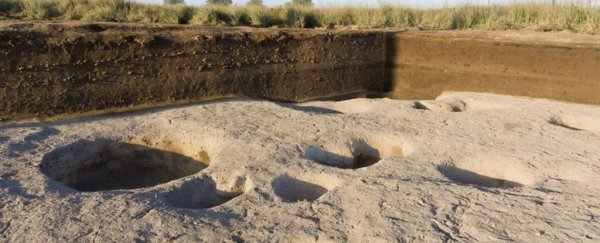Egyptian archaeologists have unearthed an incredibly rare treasure in the Nile Delta: the remains of an ancient village, dating back to around 5,000 BCE. It's one of the oldest ever discovered in the region, predating the pyramids at Giza by 2,500 years.
The Neolithic site, at the fertile Tell el-Samara some 140 kilometres (87 miles) north of Cairo, is up to around 7,000 years old, according to the Egyptian Ministry of Antiquities.
The joint French-Egyptian excavation team found several storage silos, containing organic matter - animal bones and plant residues - that allowed them to date the site. They also found pottery and stone tools, indicating a stable community.
These discoveries open up an opportunity to identify and learn more about the prehistoric communities that occupied the Nile Delta thousands of years before the legendary King Menes united upper and lower Egypt, founding the first Pharaonic dynasty.
"Analysing the biological material that has been discovered will present us with a clearer view of the first communities that settled in the Delta and the origins of agriculture and farming in Egypt," said Nadia Khedr of the Egyptian Ministry of Antiquities.
The researchers believe that the farming practices in the village could have been heavily reliant on rain. This could help shed some light on the development of irrigation-based farming later practised in the Nile Delta for thousands of years.
In another recent discovery, archaeologists revealed that the ancient Egyptians were deliberately mummifying their dead much earlier than thought. The team found evidence of early mummification up to 5,600 years old - also before the time of the Pharaohs.
While there was no mention of mummification found at the Tell el-Samara site, it is potentially an invaluable resource for learning more about the early settlement of ancient Egypt.
Excavations at the site will be completed in the next season, followed by a full analysis of the discoveries.
